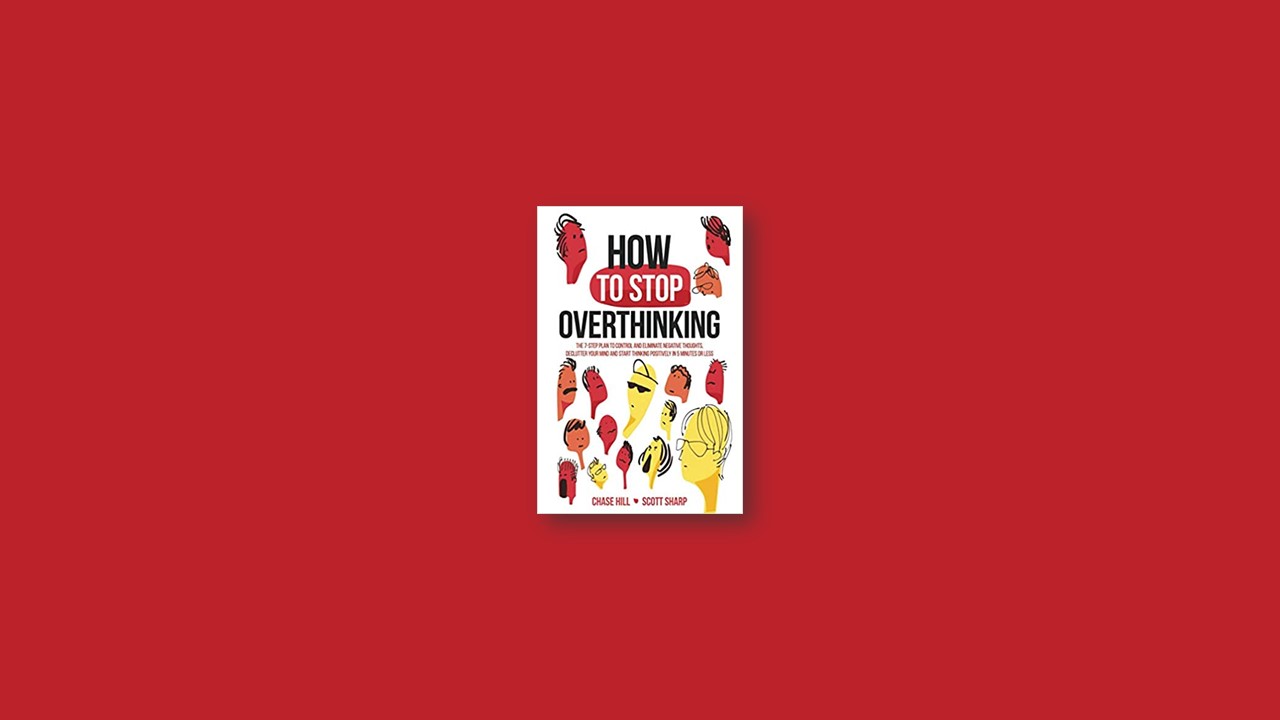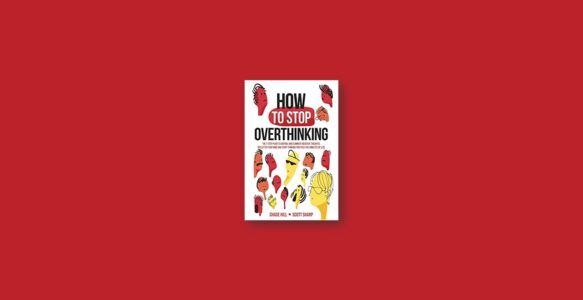There is worrying, and then there is over-worrying. Much like overthinking, over-worrying is when you torment yourself with thoughts of the past, present, and future and try to control what cannot be controlled. It is a condition where you can feel an overload of stress and anxiety, constantly feeling uneasy, even over small things. Disorders like anxiety, OCD, and depression can be a result when someone develops excessive worrying. We suffer by making it difficult to overcome our fears because we are too scared of the fear itself to problem-solve and come up with a solution.
How to Stop Overthinking for Good
Overthinking has been proven to create more restless or sleepless nights, attack your immune system, raise the chances of developing PTSD, and increase the risk of dying at a younger age. The thought behind worrying that causes so much anxiety is that people cannot accept one simple truth: We do not have control over certain things that happen in our lives. The primary reason most people worry is because they either second-guess every choice or decision they make, or they cannot accept that they don’t have control, and so they become perfectionists or “control freaks” to make themselves feel better. However, is the need to control or perfect everything really making you feel better? If your answer is no, then take a look at these ways you can control your mind in a positive way.
#1. Set a “worry time”
By setting a specific time for when you can worry, you practice telling your worries that you don’t have time right now, but that you will have some time later to address the problems. Make sure this “worry time” is not right before bed or in the middle of a hectic time of day, like cooking dinner. Make sure it is no longer than an hour. That way, it gives you plenty of time to address all your worries and come up with effective solutions. Also, end your “worry session” with meditation or calm-breathing exercises.
Acknowledge the thought or worry. When there is a worry that arises during your day that you cannot let go of, write it down and acknowledge it. Do not try to avoid the thought or push it away, as this will only make it worse and “louder.” Accept that the worry may not go anywhere and move on. Don’t pay too much attention obsessing over it; just acknowledge that it is there. When you are in your “worry time,” look at the notes you wrote throughout the day and assess these first .
Write them down and pick them apart. Keep a journal. This is effective because when we try to think about our worries during a busy day, we are most likely thinking illogically or irrationally. When we write our worries in a journal, we can not only vent, but we can also see the patterns in our thinking to pick the negative thoughts out and replace them with positive ones. It also helps us look at our worries as a whole, so we can gain better insight as to what to do next.
#2. Practice mindfulness
Mindfulness is when you intentionally allow yourself to be in the present moment. It’s to look at the red colors and count how many things in the room are red (or any other color). If you are drinking or eating something, then it is to be completely present with the taste, texture, smell, and sight of the item you are consuming. So, in a deeper meaning, when a worry arises, don’t pick it apart, don’t judge it, don’t get anxious about it – simply understand that this worry is just a thought and that is all it is. There is no action you need to take; there are no feelings you need to attach to it; there is nothing you need to do with this thought except to be mindful that it is there. If you are having trouble with this, seek professional, therapeutic help or look up videos on the internet to walk you through this process.
#3. Exercise/Get physical
Tons of studies from all over and almost everything you read says that mental health disorders may be coming from the gut. When we eat better and healthier things, we have more energy. When we have more energy, we can discover productive ways to release this energy, like working out and exercising. Go for a mindful jog, a relaxing yoga class, or do sit-ups and on-the-spot exercises from the comfort of your own home, like running in place, squats, and push-ups. It may be a good idea to enroll in boxing classes or join a sport. Also, when you get your blood flowing and your heart pumping, you have less energy mentally to focus on the many worries that pop in your head, which also helps you sleep better at night.
#4. Figure out what is out of your control
This works best when you have a therapist or guidance counselor to help you, but in case you want to try this on your own for whatever reason, find what you can control and let go of what you can’t. For example, you cannot control someone else’s behavior, but you can control how you react and what you perceive from their words or actions. Understand that, in most cases, you can only control how you react or behave in situations or when confronting someone else.
#5. Evaluate your fears
When your worries become too much, pause and find the root of this worry. Most of the time, it stems from a fear that something is going to happen. Your fears are usually coming from worries that you haven’t acknowledged yet. Ask yourself, “Am I predicting the future? Am I doubting that I will be able to handle whatever happens next?” Most of the time, we underestimate our abilities to gain control of ourselves and handle situations. Sometimes you just have to face the fears, challenge your thoughts, and let whatever happens happen. More often than not, you will see the circumstance was not as bad as you thought.
#6. Practice meditation
Meditation is one of the most effective relaxation strategies. When we are relaxed, it is easier for our brains to unwind and shut down for a while. Most meditation focuses on our breathing. Through meditation, you can learn how to breathe effectively, where to breathe from, and to be more aware of how you are breathing when out and about. Although meditation may not do something for you right now if you are expecting immediate relief, you will feel more at peace over time. Meditation is not just a quick fix to calming you down, but a long-term, effective solution in training your mind to handle stressful situations better. A peaceful, calm mind is a happy, calm soul. When our souls are peaceful, our lives are also peaceful.
#7. Develop positive self-talk
When you have a nagging, worried mind, it usually means that you are not giving yourself credit for the stressful things you have been through before. Develop this thought when you get panicked: I have gotten through harder and worse situations than this before, so I am fully capable of handling what I am facing now. Try to replace your doubting thoughts with healthy mantras for quick, in-the-moment relief. If you catch yourself saying, “I don’t know if I can do this,” then replace it with, “I know I can.” When you catch yourself thinking, “I hope he or she doesn’t judge me,” then replace it with, “I am confident,” or, “I am resilient.” Even if you do not believe in the positive things you tell yourself, the longer and more frequently you think them, the more your mind will develop these positive ways, and the less likely your worries will be negative.
#8. Replace your worries with truths
When you worry about the past or the future, replace these worries with: “All we have is now; I cannot control yesterday, and I cannot predict tomorrow. ” By replacing your worries or fears with the truth, you will find yourself able to stay calm in the present moment. Most of the time, we worry about things out of our control, attempt to predict the future, or stress too much about what is happening right now. If you are in a meeting and your mind begins to worry about how you are not going to be good or do good, then say to yourself, “Look at me, I am doing fine so far. If I mess up, I can and will be able to fix it.” By reinforcing positive thoughts and replacing worries with truth, your worries decrease, and you will automate this strategy over time.
#9. “What if’s” don’t matter; “How Can I” Does
When you stress about, “What if the house burns down?” Or, “What if I didn’t unplug the lava lamp?” Or, “What if I forgot something?” Instead, think, “How possible is it that my house burns down? How can I solve the lava lamp problem? How can I manage if I forgot something?” Do you see the difference when you change “what if” to “how can I”? Most of the time our “what if” worries are exaggerated, irrational, and sometimes even illogical.
#10. Accept the unknown
The unknown is a certain thing that we all face. It is sort of like thinking and stressing over things we cannot control because we don’t know what is going to happen. Too many people NEED to know everything and plan it all out. Try developing the strategy to just be. Just understand that unexpected things happen, so hope for the best and don’t expect much more than that.
In conclusion, our worries stem into fears, which give us anxiety. When we get anxious, we forget to use our logical minds, and then our worries take over and send us into a spiral of out-of-control thinking. By developing and improving these effective strategies to overcome over-worried minds, you will find that you have less anxiety and are able to “control” more things around you, including yourself.


